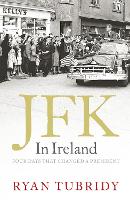|
|
presidents & heads of state
|
|



|
|
| book details |
JFK in Ireland: Four Days that Changed a President
By (author) Ryan Tubridy

|
This book is currently unavailable. Enquire to check if we can source a used copy
|
| book description |
In his first book, award-winning radio and TV presenter Ryan Tubridy tells the fascinating story of the iconic president John F Kennedy's visit to Ireland. The idolized, handsome and glamorous John Fitzgerald Kennedy was the great-grandson of Irish immigrants and the first and only Irish-Catholic American elected as President of the United States. He relished his Irish heritage and in June 1963 made a memorable four-day trip to his homeland, which he called the best 'four days of his life'. Tragically, five months later he was assassinated. In this fully illustrated book, Tubridy reveals the huge effect JFK's visit had on Ireland – a country that at the time was largely agrarian and extremely poor. He includes never-seen-before photos of the president and private documents that reveal how the Irish rejoiced in having a president visit their shore. Tubridy evaluates whether the well-loved president, whose 'Camelot' years some believe would have heralded a golden age, actually inspired Ireland to reinvent itself and instilled pride in the Irish people, or whether the myth of JFK just left behind an idyllic dream of what could have been. This book is a fascinating, unique and insightful read from one of Ireland's most popular personalities.
| product details |
Normally shipped |
Publisher | HarperCollins Publishers
Published date | 28 Oct 2010
Language |
Format | Digital download
Pages | 320
Dimensions | 0 x 0 x 0mm (L x W x H)
Weight | 0g
ISBN | 978-0-0074-1234-1
Readership Age |
BISAC | biography & autobiography / presidents & heads of state
| other options |
|
|
|
To view the items in your trolley please sign in.
| sign in |
|
|
|
| specials |
|
|
An epic love story with the pulse of a thriller that asks: what would you risk for a second chance at first love?
|
|

|
Mason Coile
Paperback / softback
224 pages
was: R 520.95
now: R 468.95
|
A terrifying locked-room mystery set in a remote outpost on Mars.
|
|
|
|